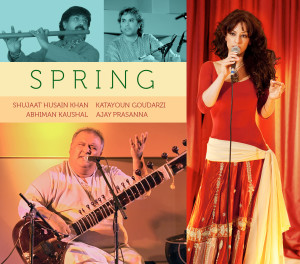 It’s winter here in the Northern Hemisphere, but one of the most beautiful musical releases of the past few months is called Spring. It’s a collaboration between an Indian sitar master and a Persian-American singer that sets to music the works of the Sufi mystical poet Rumi. Spring features Shujaat Husain Khan, the son and disciple of the late master sitarist Ustad Vilayat Khan, and the melodic recitations of Katayoun Goudarzi, who has immersed herself in Persian poetry for the past three decades. They are joined by tabla player Abhiman Kaushal and flutist Ajay Prasanna, whose instrument adds another expressive, evocative voice.
It’s winter here in the Northern Hemisphere, but one of the most beautiful musical releases of the past few months is called Spring. It’s a collaboration between an Indian sitar master and a Persian-American singer that sets to music the works of the Sufi mystical poet Rumi. Spring features Shujaat Husain Khan, the son and disciple of the late master sitarist Ustad Vilayat Khan, and the melodic recitations of Katayoun Goudarzi, who has immersed herself in Persian poetry for the past three decades. They are joined by tabla player Abhiman Kaushal and flutist Ajay Prasanna, whose instrument adds another expressive, evocative voice.
There’s a long tradition of musical accompaniment of recitation of devotional Hindu poetry; this adventurous disc and others by this duo build on that tradition, substituting these Persian “ghazals” by Rumi for the Hindu poetry. It may sound quite jarring to those familiar with either tradition, but to my Western ears it’s beautifully exotic and quite stirring.
This is not Goudarzi and Khan’s first collaboration. An earlier work, which involved Western jazz and rock musicians in addition to themselves and a tabla, to me seemed to float into the territory of New Age jams. I don’t think it’s cultural imperialism on my part (though it might be) that I prefer this less-hybridized approach.
Here’s a promotional video about this project as an introduction:
In addition to playing sitar with great skill, Shujaat Khan also sings in a bold and warm baritone, as you’ll hear in the opening track of the first disc, “Paradise” and elsewhere. After he sings what seem to be a couple of verses, his sitar moves to the background and Goudarzi takes the microphone to recite Rumi in her deeply sensuous voice. Once she’s finished, the sitar picks up the pace and returns to the foreground for a passionate crescendo, after which Khan winds things down with his warm and homely voice.
It’s the same basic pattern on the remainder of the works on this two-CD set, although many of the tracks contain more variety and rhythm as the flute and tabla join in. It’s a magical blend of sounds that perfectly focuses the ear and mind on the poetry. Of course I don’t understand the poetry, but it doesn’t seem to matter. The music and recitation quite adequately convey the sense of joy and wonder at the natural world and creation and the emotions of love and exaltation that are conveyed by the song titles – the aforementioned “Paradise,” “Spring,” “Blissful,” “My Insane Heart,” “Autumn” and others. You certainly don’t need to understand the words to feel this music and poetry.
Self-released, 2013
